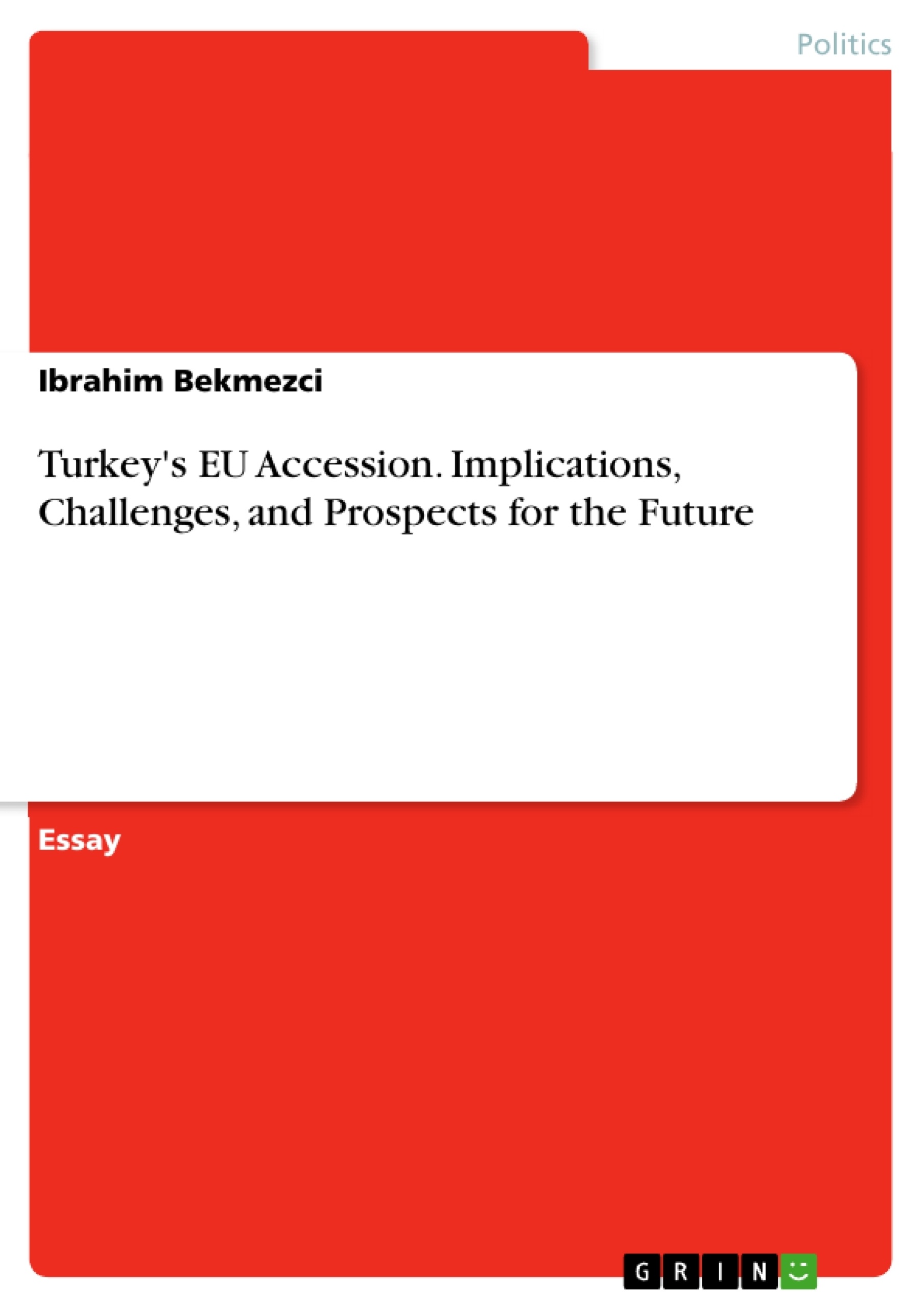The aim of this essay is to explain the important implications of Turkey's accession to the EU and the resulting problems that lead to a delay in Turkey's accession to the EU. First, the essay provides a historical background to current EU-Turkey relations. On this basis, the process of Turkey's EU accession is then explained in more detail and the pros and cons arguments are discussed. This follows the examination of the meaning of Turkey's full EU membership and the possible implications in Europe. The focus is primarily on the common foreign and security policy, the possible economic effects, and the legal and institutional dimensions. The last part of the article analyzes why Turkey's candidature is so different from the other candidate countries and whether it is a problematic candidate. The decades-long delay in Turkey's EU accession is examined using the Copenhagen criteria set by the EU and cultural differences. The work concludes with a perspective view, forecasting future European-Turkish relations, whether Turkey will ever be a full member of the European Union. The essay ends with a constructive criticism in the conclusion. In addition, the present article intends to contribute to science and research by reviving the neglected European-Turkish relations currently and filling the gap in this field factually and professionally. In the present study, an interdisciplinary approach is preferred. The systematic interpretation method of law is combined with the method of empirical social research from political science to better analyze the complex context of the topic.
Table of Contents
- Introduction
- What is the Historical Background of EU-Turkey Relations?
- What Does Turkey Mean in International Context?
- How Have the EU-Turkey Relations Been Since 2016?
- How Do the EU Accession Negotiations Generally Work?
- What is the Current Status of the Accession Negotiations Between the EU and Turkey?
- How is the Further EU-Turkey Cooperation Currently?
- What Does Turkey's Full EU Membership Mean, Especially for the EU?
- What Does Turkey's Full EU Membership Mean, Especially for Turkey?
- Is Turkey a Problematic Candidate?
- New Perspectives and Outlooks
Objectives and Key Themes
This essay examines the complex relationship between Turkey and the European Union, focusing on the prospects of Turkish accession. It explores the historical context of their relations, analyzes the current status of accession negotiations, and discusses the potential implications of Turkey's full membership for both Turkey and the EU.
- The historical background of EU-Turkey relations
- The process and current status of Turkey's EU accession negotiations
- The potential implications of Turkey's full EU membership for both Turkey and the EU
- An assessment of Turkey's candidature and potential challenges
- An outlook on future EU-Turkey relations
Chapter Summaries
The introductory chapter sets the stage by discussing the potential impact of Turkey and Ukraine joining the EU, highlighting the significant changes this could bring to the European Union and the international system. It then focuses on Turkey's long-standing application for EU membership and its ongoing efforts towards fulfilling the criteria for accession. The essay outlines its core objectives, including an analysis of the legal basis of EU-Turkey relations, the current state of accession negotiations, and the possible consequences of Turkey's full membership.
The following chapters delve into the historical background of EU-Turkey relations, examining key events and milestones that have shaped their relationship. The process of Turkey's EU accession is then explained in detail, including the various stages and requirements. The essay explores the potential benefits and challenges that Turkey's full membership would bring for both Turkey and the EU, considering aspects such as foreign policy, economic effects, and legal frameworks.
The essay further analyzes the distinct position of Turkey as a candidate country, exploring the potential reasons behind the delays in its accession process and its unique characteristics compared to other candidate countries. It considers the Copenhagen criteria for EU membership and cultural differences as potential factors in the delay.
Keywords
The main keywords of this essay include EU-Turkey relations, accession process, European integration, Turkish accession to the EU, Copenhagen criteria, cultural differences, political and economic implications, foreign and security policy, and the future of EU-Turkey relations.
- Quote paper
- Ibrahim Bekmezci (Author), 2023, Turkey's EU Accession. Implications, Challenges, and Prospects for the Future, Munich, GRIN Verlag, https://www.hausarbeiten.de/document/1402114


